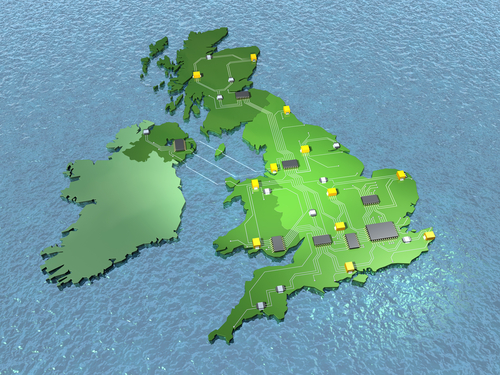So-called ‘Digital Britain’ is fast becoming divided Britain. While the impact on house prices of poor broadband connections is well established, it is the impact on businesses that is most damaging.
How can UK companies struggling with 2Mbps compete with global competition that already have 100Mbps and a commitment to 1Gbps soon? 4G may be the answer.
An inadequate communications network is placing UK businesses at serious risk of falling behind the competition – not only in Europe, but across the developing world.
As growing numbers of organisations globally begin to exploit the cost and agility benefits of cloud-based deployment, far too many UK businesses are still constrained by the slow broadband speeds available – and not only in rural locations.
>See also: What 4G means for business
Cloud services are simply too high risk for any business that cannot access reliable, high-speed broadband.
The government’s Digital Britain pledge back in 2009 insisted that there would be 100% broadband coverage across the UK by 2012, with a minimum speed of 2Mbps.
Yet, as we near the end of 2014, significant parts of the country are still waiting.
During those intervening five years, the landscape has changed fundamentally. With the dominance of cloud computing, the reality is that 2Mbps is barely adequate to support a business running all of its applications and storing all of its data in the cloud.
This is a fact clearly recognised by the rest of the world. Even countries with struggling economies such as Spain have a phenomenal communications network, both wired and mobile.
Meanwhile, in China and Japan, 100Mbps to the home is commonplace, with promises of gigabit to the home shortly.
How can a UK business struggling on with intermittent 1Mbps compete?
Taking control
Today, the majority of businesses perceive the only option for broadband is the fixed line delivered by BT.
If BT has no plans to upgrade the network any time soon, the business is scuppered. But this is frankly ridiculous – especially in an era where 4G networks can offer download speeds of 10 to 30Mbps.
So why are businesses not using 4G? Costs are not prohibitive and deployment is not an issue, so why do so many businesses still believe they need to wait for the fixed infrastructure to be upgraded?
>See also: Europe enjoys the cheapest 4G LTE tariffs in the world
4G is being used widely across the world – especially in South Africa and Australia – to bring broadband to rural areas, and as a far quicker and lower-cost way of expanding high-speed communications.
Indeed, in many ways the UK’s evolution has been constrained by its early lead in the provision of copper networks – the perception still remains that hard wired is more reliable than mobile.
Other countries without this wired infrastructure have put far more investment into mobile communications simply because it is far quicker and less disruptive to add a new 4G mast than laying cable in the road.
As a result, these countries are far ahead of the UK in providing universal high-speed broadband via 4G.
The good news is that the rollout of 4G continues apace, with coverage in hundreds of UK cities already.
However, there are perception barriers to overcome – with many businesses somewhat scarred by inconsistent 3G experiences and complaints regarding service availability and performance.
Mobile services are contended, leading businesses to believe mobile data isn’t as reliable as a fixed-line offering.
Critically, these increasingly essential cloud services and hosted applications require both more bandwidth and greater reliability. Therefore, businesses need to be convinced that 4G networks will offer a true fixed-line alternative to drive adoption.
New communications reality
4G can cater for much higher bandwidth and can be used to back up fixed-line services as standard. There is also the option to bond multiple 4G connections from multiple providers. Linking multiple 4G networks can achieve a stable 50Mbps, with the benefit of additional reliability in terms of uptime and throughput, plus the resilience of different providers.
50Mbps may seem low when single 4G connections can deliver almost that in certain locations, but by carefully controlling the latency and taking control of the connection, stability that isn’t available on a single connection can be attained.
Alternatively, a company can opt to bond the existing fixed-line infrastructure with 4G – or 3G for that matter – to improve existing speeds and provide additional resilience.
Of course, a big sticking point for most companies when it comes to mobile networks is the data cost. Until recently, such concerns were valid – but mobile data costs have plummeted with the arrival of 4G.
Today a business currently using 30Gigs per month via Microwave and BT line (8 Mbps) can have a 4G solution for the same price and achieve far higher data rates.
Critically, the business can perform effectively, exploit innovative cloud-based deployments without fear of business compromise, and compete on a level playing field with the global competition.
The issue is not simply one of speed; it is resilience and reliability. No organisation can afford to move into the cloud without very high levels of network availability.
When all data and applications are online, a lost connection signals the end of business until it is recovered.
The reality is that UK businesses require not only faster upload and download speeds than those on offer from standard fixed connections, but also better resilience and quality of service.
UK businesses cannot afford to be on the wrong side of the digital divide. Rather than waiting for BT to upgrade local services, it is likely that many will begin considering alternatives.
Sourced from Mike Van Bunnens, Comms365







